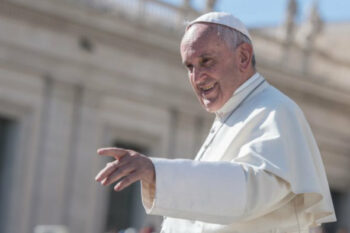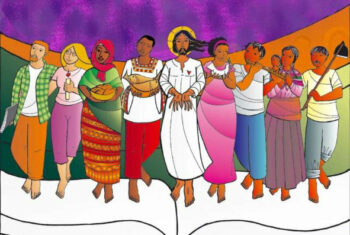Bread of Life
 Jesus states clearly: “I am the bread of life” (John 6:48).
Jesus states clearly: “I am the bread of life” (John 6:48).
What does bread of life mean? We need bread to live. Those who are hungry do not ask for refined and expensive food, they ask for bread. Those who are unemployed do not ask for enormous wages, but for the ‘bread’ of employment. Jesus reveals himself as bread, that is, the essential, what is necessary for everyday life. Without him, rather than living, we merely get by, because he alone nourishes the soul, he alone forgives us from that evil that we cannot overcome on our own. He alone makes us feel loved even if everyone else disappoints us. He alone gives us the strength to love and he alone gives us the strength to forgive in difficulties. He alone gives that peace to the heart that it is searching for, he alone gives eternal life when life here on earth ends. He is the essential bread of life.
His entire being and mission
“I am the bread of life,” he says. Let us pause on this beautiful image of Jesus. He could have offered a rationale, a demonstration, but – we know – Jesus speaks in parables, and in this expression: “I am the bread of life,” he truly sums up his entire being and mission. This will be seen completely at the end, at the Last Supper. Jesus knows that the Father is asking him not only to give food to people, but to give himself, to break himself, his own life, his own flesh, his own heart – so that we might have life. These words of the Lord reawaken in us our amazement for the gift of the Eucharist. No one in this world, as much they might love another person, can make themselves become food for them. God did so, and does so, for us. Let us renew this amazement. Let us do so as we adore the Bread of Life, because adoration fills life with amazement.
Tell God everything
God became man to enter into the concrete reality of this world, to enter into our concrete reality – God became man for me, for you, for all of us, in order to enter into our life. And God is interested in every aspect of our life. We can tell him about what we are feeling, our work, our day, our heartache, our anguish, so many things. We can tell him everything because Jesus wants this intimacy with us.
Invite him home
“I am the bread of life.” At least once a day we find ourselves eating together, perhaps in the evening with our family, after a day of work or study. It would be lovely, before breaking bread, to invite Jesus, the Bread of Life, to ask him simply to bless what we have done and what we have failed to do. Let us invite him into our home. Let us pray in a ‘homely’ style. Jesus will be at the table with us and we will be fed by a greater love.
May the Virgin Mary, in whom the Word became flesh, help us to grow day after day in friendship with Jesus, the Bread of Life.
Source: Angelus Address
8 August 2021, vatican.va
 World Mission Day
World Mission Day
The theme of this year’s World Mission Day – “We cannot but speak about what we have seen and heard” (Acts 4:20), is a summons to each of us to own and to bring to others what we bear in our hearts. This mission has always been the hallmark of the Church, for “she exists to evangelise” (St Paul VI, Evangelii Nuntiandi, 14).
Our life of faith grows weak, loses its prophetic power and its ability to awaken amazement and gratitude when we become isolated and withdraw into little groups. By its very nature, the life of faith calls for a growing openness to embracing everyone, everywhere. The first Christians, far from yielding to the temptation to become an elite group, were inspired by the Lord and his offer of new life to go out among the nations and to bear witness to what they had seen and heard, that the good news of the Kingdom of God is at hand. They did so with the generosity, gratitude and nobility typical of those who sow seeds in the knowledge that others will enjoy the fruit of their efforts and sacrifice. I like to think that “even those who are most frail, limited and troubled can be missionaries in their own way, for goodness can always be shared, even if it exists alongside many limitations” (Christus Vivit, 239).
Source: Message for World Mission Day
6 January 2021, vatican.va
 Entries(RSS)
Entries(RSS)